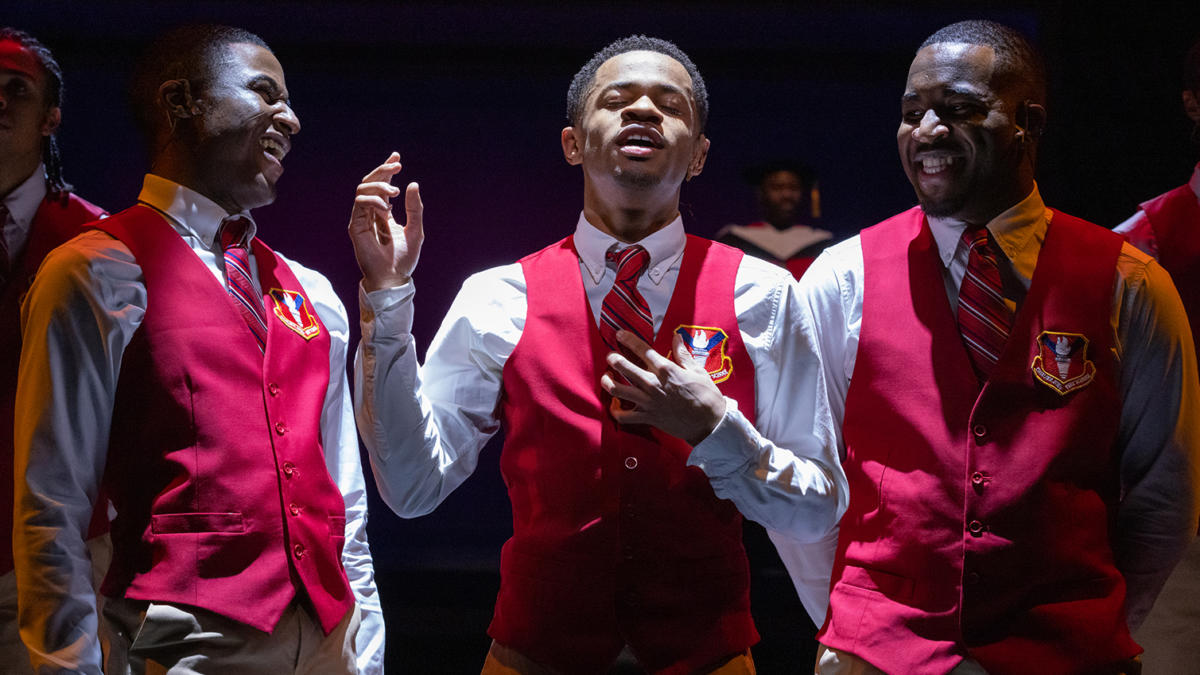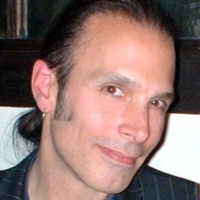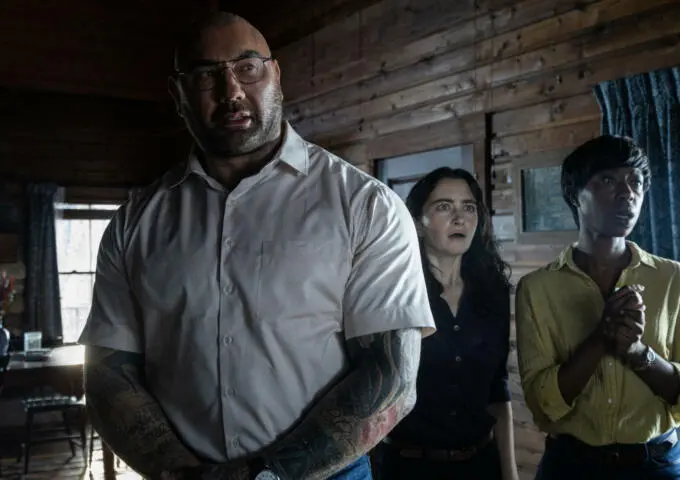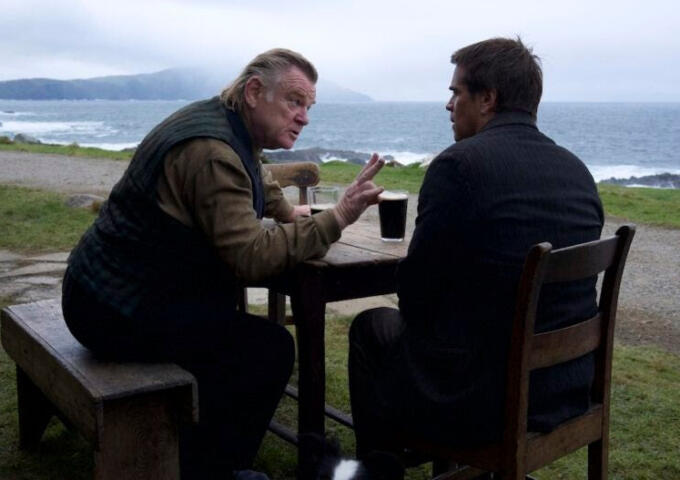As far as coming-of-age stories go, Tarrell Alvin McCraney has a lock on some the 21st Century’s most bracing and necessary tales.
The Black, openly gay playwright, screenwriter and author, by age 40, penned the forward-thinking Ms. Blakk for President for Chicago’s Steppenwolf Theatre, In Moonlight Black Boys Look Blue, an autobiographical school project which became the inspiration for Moonlight, the 2016, Oscar-winning film and screenplay, and controversially adapted Shakespeare’s Antony and Cleopatra for the Royal Shakespeare Company in 2013 as a 18th-Century Caribbean tale. Each work was an intimate portrait of Black life that had, before McCraney, seemed cloistered and private.
When asked during an interview with The Reckoning about centering his writing on the lives of Black and queer people, McCraney stated, quite simply, that it was because these same people, in the past, didn’t have the privilege of seeing the fullness of their lives reflected back toward them.
“Or we didn’t get to see it often enough,” said McCraney, “Now we have many ways of seeing it, and we’re getting many more, which is exciting. I think the question then becomes, what else are we missing? And that’s where things start to get exciting. I want to give us a chance to see ourselves in all the possibilities. My process has been, and always will be, to make the intimate epic.”
Running this week through the Philadelphia Theatre Company (PTC) at the Suzanne Roberts Theater (until March 13) is McCraney’s most intimate, queer Black epic, Choir Boy.
Directed by PTC Resident Artist Jeffrey L. Page, and utilizing an original gospel music and R&B-based song score composed by Crystal Monee Hall, the lives of McCraney’s wounded characters – even at their bleakest hours – are given a chance to heal, an inner light, through this music. The future of becoming proud, positive Black men, from boyhoods filled with pain depends on this very flight. To paraphrase Leonard Cohen, then, the children of Choir Boy must find “the crack in everything, that’s how the light gets in.”
Issues of agency, masculinity, personal, scholastic and professional tradition, legacy, strength and sexuality all get examined with honesty and compassion through McCraney’s Choir Boy.
“This play is about is a coming-of-age story about young black boys becoming men in a world that steals black men’s softness at an age much too early,” says PTC actor Justen Ross, the lead on whose axis Choir Boy spins.
“These boys are struggling with having an outlet to express the afflictions that they are experiencing. The one thing that they all can agree on, the one place where they can all meet, is singing these songs: choir practice. It is there and there alone that these boys can express the pain, express the tribulation AND the probation that they feel as if they are on.”
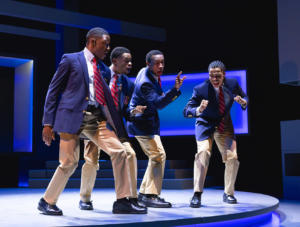
Photographer: Mark Garvin
North Carolina-to-New-Orleans stage director Lauren E. Turner is currently in Philadelphia to direct the work of another equally prolific and equally out, Black playwright, Philly’s James Ijames’ TJ Loves Sally 4 Ever at Norristown’s Theatre Horizon. Along with being a longtime friend of Ijames, Turner has produced and directed work for her own theater company, No Dream Deferred NOLA, whose most prized production came with their 2020 iteration of McCraney’s In the Red and Brown Water. Of his work, Turner claimed that an immersion is required so to get at the very soul of its author, as well as the very salvation of all things Black and self-empowered.
“Tarell’s writing – whether it is as a director, as a Black woman, and as a Black woman from the South – it is freeing in a sense so that it resonates on a deep and spiritual level, always,” says the director. “That allows the storytelling of his to be fully embodied – that is, if embodiment is required. You can’t phone it with a McCraney play. It’s all deliberate. You have to be specific in your choices as an actor and director because McCraney is so specific.”
The specifics of McCraney’s Choir Boy find five, fine young Black men in attendance at the prestigious Charles R. Drew Prep School for Boys with only one of them, choir leader Pharus (Justen Ross) proving to be open and out in his sexuality. While it is bad enough that the open-hearted Pharus is pelted with homophobic slurs and hostile mistreatment from his fellow students, Justin (Tristan André) and Bobby (Jeremy Cousar, for revealing his inner-most secrets, an out Pharus is instructed by the prep school’s headmaster (Akeem Davis) to perhaps lean back from his perceived effeminate mannerisms. And while the straight student, AJ (Jamaal Fields-Green) has his own hard row to hoe despite being sympathetic to Pharus’ troubles, David (Dana Orange) also has much in which to contend as he navigates his studies in the ministry while struggling with his own inner demons of legacy and sexuality.
Talking with Choir Boy PTC’s Pharus (Justen Ross) and David (Dana Orange) about their roles in the play was to glean the true meaning of what it means to act and live with passion and honesty.
Ross, an Atlanta, Georgia native quick to acknowledge Philadelphia warmth (“Southern hospitality might just not be a Southern thing”) calls himself an artist who doesn’t need permission to create. With that, Ross’ pandemic has been filled with his own Tik Tok stand-up comedy bits and self-written readings on Instagram before he got back to his “bread and buttahh” of the live stage at PTC.
“Pharus is a star-born child,” starts Ross. “We’re meeting him in his senior year in high school at a dead end in his romantic life, in his mental life, his emotional and spiritual life.”
Ross is just winding up. “Pharus’ adolescence is over, yet in the middle of this, he is a symbol of endurance, of Black queer excellence. He is the embodiment of somebody who doesn’t knows where his pleasure begins and his service ends – he is becoming undeniable because of being a Black gay man. He is both too much and not enough. Pharus has his weak spots. He has a very special connection to his ancestors, and with his God and his spiritualty…. that’s what helps him persevere. And in this show, he gets his dreams snatched from him, time and time again. He is backed into a corner, facing dead ends without knowing how to get out. But Pharus is in close communication with God and his ancestors on how to push through… get through it all… because there is fruit to be had on the other side. Plus, Pharus is going through all of this while being in love with Dana’s character, David.”
Mic drop.
Ask Orange – an actor living between Baltimore and Philadelphia, who has spent time apprenticing and working with the Walnut Street Theatre (most recently in their live action version of the Disney musical, The Little Mermaid) – if that love is reciprocal, and the answer is hardly cut-and-dried.
“David, along with all of these boys, is troubled,” says Orange. “My David can’t understand where his life is supposed to go right now. He is being told that he has to live a certain way. All he wants to do is please the people around him, to make sure that his parents are accepting him and that he is pleasing God. David wants to make sure that he is pleasing his teachers who are telling him that in order to achieve his goals he must do things in a structured way. He wants to please his fellow students. All this is really hard for David as he is finding out that he wants to please himself, do the things that he wants to achieve, and yet he feels like he can’t because of all that is being forced onto him. This struggle, David’s religion and his family’s legacy, makes it so that he is not allowed to have any hint of queer love… even if it is what he truly wants. He has his end goals, a desire to become a pastor, and truly show his parents that he can be the man he was raised to be. Yet, he wants to be free. We see the weights and the balances and the pressures within him throughout the play – the struggles.”Along with sharing the passion of their commitment to McCraney’s already unshakably truthful and gently poetic words (“McCraney sparks emotions immediately through his writing,” says Ross) Orange and Ross simultaneously credit PTC director, choreographer and University of the Arts’ grad Jeffrey L. Page with a brand of magic realism for the stage.
“Page took us away from the reality and went deeper into what’s going on within the minds of each of these characters,” says Orange. “There’s a darkness there, a complexity that is more of an Expressionist view… but crisp. We were huddled up together much of the time, sharing opinions and decisions, to craft this alongside of him. We had a lot of space to experience, to make mistakes.”
Ross jumps in, quickly, with a joke “Not too many mistakes. These boys are GO-ING THROUGH IT. And we get to play and feel every bit of IT.”
Going back to the words of McCraney himself, during an interview with NPR, the playwright pursues public questions such as “How does a school that hasn’t been set up to make room for the LGBTQIA+ community make room for Pharus, who has a queer body?” and “How much of the school is allowing them to be their best self?,” and “Who do we point to and say … ‘These will be our leaders for tomorrow,’ right? And who does that selecting and why?,” before coming up with his deeply personal revelation when coming to grips with the center of Choir Boy.
“If I don’t continue to try and write down and pin down the conflicts, the loves, the hates, the things we want most in our — from my community, people can easily say we don’t exist.”
